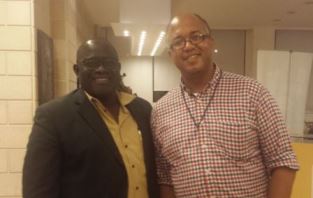By Chikwe Ihekweazu
There is increasing optimism that we will get to the end of the Ebola epidemic that has so badly affected Liberia, Sierra Leone and Guinea over the past year. In the first week of April, the lowest number of cases (30) were reported since May 2014. While there may still be some challenges ahead, the scale of the response and the translation of several learning points from the early part of the response have led to the quiet optimism that the end is in sight. This optimism is shared by responding organisations as well as health care workers in the most affected countries. Most of the current conversations have begun to focus on the restoration of health services with a strict infection control and prevention component. One organisation that has played a major role in this response but not gotten as much credit as it deserves is the “African Union” (AU).
While I was in Liberia earlier this year supporting the Ebola response, I worked with epidemiologists, doctors, nurses, pharmacists and public health officers that are part of the African Union Support to Ebola Outbreak in West Africa (ASEOWA). ASEOWA is the African Union’s contribution to on-going efforts to stop the transmission of the Ebola Virus Disease (EVD) in Guinea, Liberia and Sierra Leone. Under Operation ASEOWA, health professionals were mobilized from around the African continent and deployed to the affected countries to assist with outbreak control efforts. This is the first time ever that the AU is initiating and implementing a mission of this size in response to a health crisis on the continent. The mission has contributed significantly both in supporting the public health as well as clinical response to the outbreak. It contributed epidemiologists, who became part of the outbreak response activities, and clinicians supporting the restoration of critical health services.
The ASEOWA team of close to a thousand colleagues was made up of large contingents from Nigeria, Kenya and Ethiopia. Being Africans themselves, most of the ASEOWA team quickly integrated into various aspects of the response and rapidly gained the confidence of local colleagues. Whenever necessary, they joined teams in the field, going to some of the “hardest-to-reach” areas to support various outbreak control activities. As the cases began to decline, members of the team were increasingly deployed into healthcare facilities to support activities that would lead to the restoration of services to the population. They acted not just as rare clinical resource in this situation but also provided emotional support and inspiration to other colleagues who felt exhausted and anxious after months of working under such difficult circumstances.
This being the first deployment of human resources in a health mission ever by the AU, there were some teething problems. Some colleagues had to wait longer than necessary before they were deployed to specific roles, and there were some uncertainties about where exactly their skills could be optimally utilised within the large response. The deployment of close to a thousand colleagues also required significant human resources management and logistics. There will definitely be many lessons to learn. A comprehensive and independent evaluation of Operation ASEOWA is needed to learn vital lessons, both from the deployed individuals and the receiving countries
The large Nigerian delegation was ably led by Dr Joshua Obasanya, deployed from the Nigerian Centre for Disease Control. He was until recently the Director of Nigeria’s Tuberculosis Control Program so came with years of experience of managing not only one of the oldest diseases known to man but one that had similar difficult elements that are key to the control such as “contact tracing”. He was also part of the team that contained the outbreak of Ebola in Nigeria.
There have been recent pronouncements about the potential establishment of an “African Centre for Disease Control”, maybe following the European model “European Centre for Disease Control”. While this is a great idea on face value, it may be a bit premature. Right now, priority should be given to strengthen each country’s capacity to carry out their statutory responsibility of responding to infectious disease threats in their own countries. In addition, the international health regulations actually provide an excellent framework for action from the international community when this is needed. While there is general agreement that this may not have worked optimally in this response, emphasis should be laid on strengthening capacity in individual countries rather than creating new organisations with uncertain mandates. The primary responsibility of preventing, managing and controlling infectious disease threats should remain firmly with each country.
However, in exceptional circumstances like this, the AU should indeed be well placed to mobilize resources from countries like Nigeria, and it has done this fairly successfully during this response. Hopefully, there will be many lessons to be learnt, so that, while we are grateful for all the help from outside, the skills and experience gained by African colleagues on this mission will serve the continent well.
We look forward to welcoming those of our ASEOWA colleagues, who are still in the field, back home.




